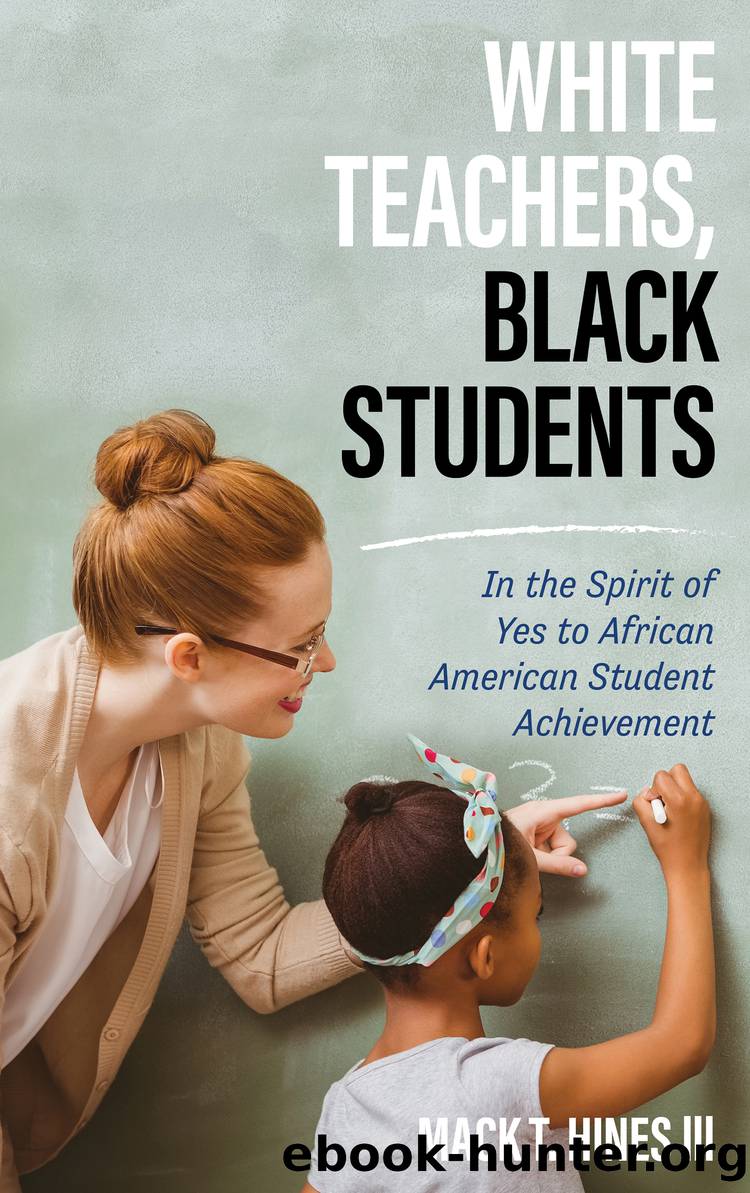White Teachers, Black Students by Hines Mack T. III;

Author:Hines, Mack T., III; [Hines, Mack T. III]
Language: eng
Format: epub
Publisher: Rowman & Littlefield Publishers, Incorporated
Published: 2017-07-13T00:00:00+00:00
5
A Behavioral Passport to Black Student Achievement
The introduction marked the initial discussion of discipline and African American students. In particular, statistics were used to highlight the ways in which African American children are categorized in accordance to behavior. What I have found is that much of these behavioral issues occur in classrooms with White teachers. As such, this chapter presents a framework for White teachers to use to establish a positive disciplinary relationship with African American children.
The Principle
What Must White Teachers Be Mindful of toBuild Positive Behavior within AfricanAmerican Students?
White teachers must realize that Black childrenâs responses to authority (redirection) are highly influenced not just by the position of the personâbut the person in the position.
Why Is This Understanding Specific toAfrican American Students?
African American studentsâ emphasis on the person is related to the Afrocentric theme of harmony. As mentioned, harmony is African Americansâ need to be harmoniously united with their environment. Drawing from this perspective, I purport that discipline for Black children is more than the issuance of consequences from teachers to students. Discipline is a highly personal negotiation of harmony between two people.
The presence of White teachers adds a significant cross-racial dynamic to this equation. Race influences White teachersâ responses to disciplinary situations pertaining to African American students. In due regard, African American students hold race-based perceptions of White teachersâ approaches to addressing them during disciplinary situations. As a result, White teachersâ personal characteristics will influence African American studentsâ responses to disciplinary situations.
The Approach
How Can White Teachers Translate ThisMindfulness into Building Positive Behavior withinAfrican American Students?
To build positive behavior, White teachers must understand power and authority through the eyes of African American students. Power is the ability to redirect the behavior of African American students. As certified figures of authority, White teachers wield the power to make commands and directives toward African American students.
Authority is the legitimacy to influence and shape the behavior of African American students. For White teachers, this level of authority is legitimated by how well they negotiate trust, respect, and understanding with African American students. To fully understand this negotiation, White teachers must consider the following questions:
TrustDo Black students trust that my use of discipline is designed to make them better people?
Download
This site does not store any files on its server. We only index and link to content provided by other sites. Please contact the content providers to delete copyright contents if any and email us, we'll remove relevant links or contents immediately.
Deep learning with TensorFlow and Keras by Derrick mwiti(905)
Understanding PDA Autism in Kids: A Guide for Parents and Teachers to Support Neurodiverse Learners by Jehu Len(839)
The Victorian Era: A Captivating Guide to the Life of Queen Victoria and an Era in the History of the United Kingdom Known for Its Hierarchy-Based Social Order by Captivating History(614)
Writing Solid Code: Development Philosophies for Writing Bug-Free Programs by Steve Maguire(538)
100 Ideas for Secondary Teachers: Engaging Parents by Janet Goodall & Kathryn Weston(514)
Intersectionality in Educational Research by Dannielle Joy Davis; James L. Olive; Rachelle J. Brunn-Bevel; Susan R. Jones(506)
How to be assertive in any situation by Hadfield Sue & Hasson Gill(500)
Brain Teasers to Build Critical Thinking Skills: Brain Exercises for Tech, Banking, Case Interview Prep, and to Keep Your Mind Sharp by Kris Safarova(488)
Brain Teasers to Build Critical Thinking Skills by Safarova Kris(484)
Python 101 - Fundamentals by Sam(454)
Critical Curriculum Leadership : A Framework for Progressive Education by Rose M. Ylimaki(445)
The Art of Emotional Validation: Improve Your Communication Skills and Transform Your Relationships by Validating Emotions and Feelings by Emily Wright(414)
A Beginner's Guide to SSD Firmware by Unknown(403)
The Knights Templar: An Enthralling History of the Rise and Fall of the Most Influential Catholic Military Order by Wellman Billy(401)
NumPy : From Basic to Advance by bisht Karan Singh(399)
Alma Maters (5th edition) by Unknown(391)
The Future Knowledge Compendium by Ellyard Peter;(390)
What Every Teacher Should Know about Learning, Memory, and the Brain by Tileston Donna E. Walker;(387)
Make wealth from intraday trading by Maddy MADDY(378)
